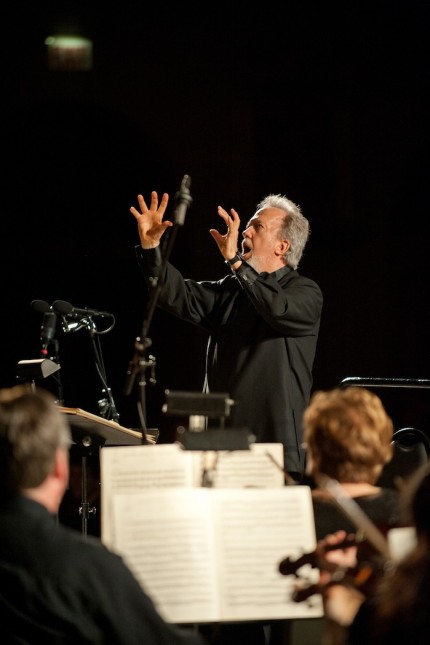After shaky start, Nelson’s “St. John Passion” belatedly reaches the heights

For the second year of the Chicago Bach Project, conductor John Nelson led his forces in the St. John Passion Wednesday night at St. Vincent de Paul Parish.
Presented by Soli Deo Gloria, a Glen Ellyn-based organization with a mission of commissioning and promoting sacred music, the Chicago Bach Project was launched last year with the St. Matthew Passion. Nelson will rotate the three major Bach sacred works every Easter, with the Mass in B minor up next in 2013.
Last year’s performance of the St. Matthew Passion, the most epic and musically rich of Bach’s works in the genre, delivered one of the musical highlights of 2011. Wednesday’s St. John Passion, the first of Bach’s settings of the Easter story, proved more inconsistent. Indeed, throughout the first half of the evening, it was hard not to feel that Nelson and company were experiencing a decided sophomore slump.
Considering the vast logistical challenges of the St. Matthew Passion—which calls for two orchestras and double choir—one would have thought that the relatively streamlined forces of the St. John would have been less of a challenge.
Whatever the case, Part One of the St. John Passion was surprisingly slack with uneven solo singing, and both orchestra and chorus sounding underrehearsed. Solo voices and obbligato instruments were unblended, and sounded like they were playing in different time zones. And even making allowances for the vastly reverberant space, the words of the chorus were too often unintelligible, especially in the opening chorus (Herr, unser Herrscher, dessen Ruhm).
Things improved significantly after intermission both musically and dramatically, as the tale of Christ’s crucifixion reached its denouement. But considering the sense of occasion last year and the scrupulous preparation for the St. Matthew, this uneven performance came as something of a disappointment.
Among the soloists, Stephen Morscheck was once again the evening’s center of gravity as Jesus. He brought a natural authority and burnished bass-baritone to the role, while also conveying human vulnerability as with his final utterance, “Es ist vollbracht” (It is done).
Nicholas Phan was promoted from tenor soloist last year to the Evangelist. Phan doesn’t quite possess the liquid fluency and sweet top notes of the classic high German tenor, but he showed unerring dramatic instincts with a consistent illumination of the text.
Marc Molomot displayed a capable if rather wan tenor in his arias (and wasn’t helped by some acid-toned viola d’amore playing in Erwäge, wie sein blutgefärbter Rücken). Matthew Brook’s dry-toned bass was lacking the sonorous weight for Mein teurer Heiland, lass dich fragen but he delivered a fine account of the arioso Betrachte, meine Seel, and, as Pilate, brought theatrical dramatic impact to his exchanges with Morscheck’s Jesus.
The female soloists likewise proved variable. Kendra Colton—a substitute for the originally slated Lucy Crowe—sang coolly in her arias, with a pallid, colorless soprano and narrow range of expression.
Meredith Arwady couldn’t seem to get her deep contralto around the corners of Von den Stricken meiner Sünden. She made up the balance with a sensitive and expressive Es is vollbracht, with superb support from viola da gambist John Mark Rozendaal.
Like everything else, the chorus—directed once again by Donald Nally—sounded better in Part Two, with radiant ensemble singing in Meines Herzens Grunde and etching the requisite spiritual glow in the closing choruses.
John Nelson’s direction was again exemplary, the conductor finding the tempo giusto for each section and skillfully putting across the theatrical moments as well as the spiritual catharsis of Bach’s music.
Posted in Performances





Posted Apr 06, 2012 at 11:05 pm by Jonathan Kraus
I love this work even a little more than the St. Matthew Passion, and I was looking forward to hearing this performance. I agree that the chorus was excellent, and that the soloists were a mixed lot; perhaps it was the fact that I heard her over the radio and maybe the miking wasn’t good, but I didn’t much like the alto’s wide, uncontrolled vibrato. Your review and John von Rhein’s review both point out the overly reverberant acoustics in that church, and the resulting mushy and unintelligible text. The text is crucial to the Passion story! Couldn’t Soli Deo Gloria find another venue?